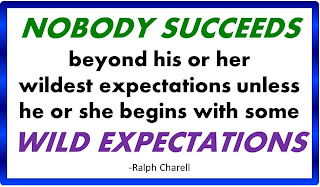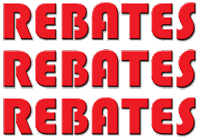The New Salesman: Success Expectations

In our first article in this series, we said product
knowledge was the bedrock of selling. From this sound foundation flows the
ability to present solutions, grow enthusiasm, and drive sales. Like a fresh
spring in the desert wilderness, product knowledge pushes to the surface. And,
just like the spring water, the most productive flows are channeled to the
place where they do the most good.
In sales, a well-developed process serves to direct product knowledge to the most productive utilization. Think of this, unless the product knowledge is presented to the right customers, with a specific set of corresponding needs and an appreciation for the value provided by the seller, resources are wasted. Miss the mark with any of these and the sales growth is compromised.
In sales, a well-developed process serves to direct product knowledge to the most productive utilization. Think of this, unless the product knowledge is presented to the right customers, with a specific set of corresponding needs and an appreciation for the value provided by the seller, resources are wasted. Miss the mark with any of these and the sales growth is compromised.
Build accelerating factors into the stream of salesperson
activities and the sales number grows faster. Insert habits which improve the
probability of closing a higher percentage of orders result.
As we move forward in this series we will discuss targeting
in great detail. But before we get to that, we should discuss some of the
fundamentals of setting expectations.
Far too often, new salespeople are turned loose on their
territory and I am called in some time later to figure out why they aren’t
performing. Typically the sales manager is at wits end, they start off with a
litany of things the seller is not doing and end by asking for my suggestions
for improvement. The sales numbers are not growing, but that’s just a symptom
of the real story. Simply put the new person is not executing their job
correctly – they’re not meeting expectations.
I believe much of selling is activity based. There’s nothing
highly magic about the situation. Give me a bright person and let me load them
with the right activities and they have a pretty good chance of success. My
first batch of expectations is purely activity based.
Here are my own expectations, yours might be different.
Either way, you need to sit down and make a list of these to insure there is no
miscommunication.
Expectation 1:
Call me old-fashioned, call me puritanical, but I believe salespeople must be
at work before 8:00 AM. With the move to more home flex offices, this is
difficult for some people to handle. At work before 8:00 AM doesn’t mean
rolling out of bed and sitting down to check emails at 8:01. It certainly does
not include dropping the kids off at school at 8:25. Sound strange, but I keep
hearing the same story.
It’s not a generational thing. I knew guys who went through
this back in the 1980s. They all had good excuses. They knew somebody who was
successful in spite of relaxed work hours. But, I suggest the new guy have
expectations laid down on the first day.
Expectation 2:
First appointment should be made for no later than 8:30. Actually this is a
double expectation. First I expect appointments to be made – no drive by sales
guys. Secondly, one of the biggest issues with new salespeople comes with
getting stuck in the office. They start the day off on time and on schedule
with a 7:30 arrival, grab a cup of coffee, and then do a few reports. Customers
call in, they get stuck doing reactive work, which could have easily been
handled by their support staff. The next thing they know it’s lunch time.
The corollary to this expectation is the expectation that
they have an appointment at 3:00 as well. Blocking out the day with two
proactive and planned activities pushes people to a whole new zone.
Expectation 3:
Salespeople take notes. I like notes in a composition book which are difficult
to pull pages out of. The salesperson should have the composition book with
them always. Phone notes, customer visit notes, sketches of proposed products,
new contacts met and everything else is in that book.
Expectation 4:
The notes are either logged into the company CRM system or reviewed weekly to
make certain that every commitment, customer request and anything else that
came up has been handled. I have a method for dealing with this information
that was taught to me by my boss back in the 80s. You probably have one two.
The point is set expectations.
Expectation 5:
Communications are critical bit of the selling business. Yet, new salespeople
still struggle to return phone calls, answer emails or get quotes back to
customers on time. I believe you should think about how much time is spent from
initial customer call to call back. I believe the answer should be no more than
a single business day. Four hours works better. The point is to lay down these
expectations.
Expectation 6:
Every sales call has a purpose. Howdy, dowdy (where you just stop in to say hi)
calls don’t cut it.
Expectation 7:
The new salesperson should know who is responsible for generating quotations.
This varies by company, but it’s not uncommon for a new sales guy to waste her
time developing a quotation just to show off technical prowess. Conversely,
quotes are delayed because the salesperson thought somebody else was going to
take care of them.
Hopefully,
you are starting to get my drift on setting action based expectations. I have
over 50 expectations for new sales folks. You may have more or less, but do
understand these aren’t passed down by osmosis.
Distributor
Planning Made Easy. Check out our
Distributors Annual Planning Workbook:
http://amzn.com/1481196448



Comments